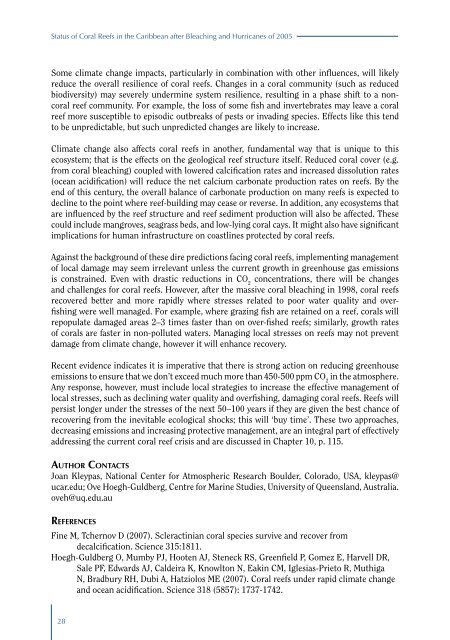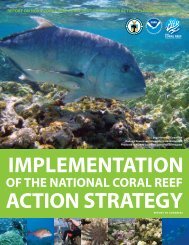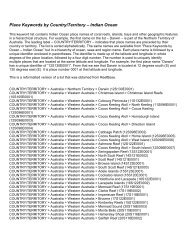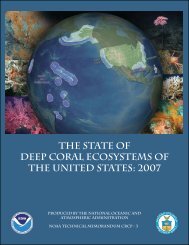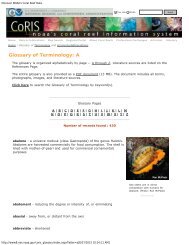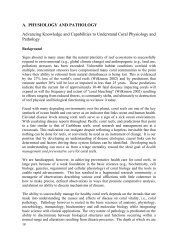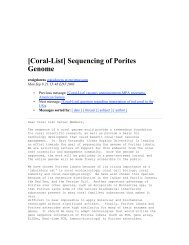Status of Caribbean coral reefs after bleaching and hurricanes in 2005
Status of Caribbean coral reefs after bleaching and hurricanes in 2005
Status of Caribbean coral reefs after bleaching and hurricanes in 2005
You also want an ePaper? Increase the reach of your titles
YUMPU automatically turns print PDFs into web optimized ePapers that Google loves.
<strong>Status</strong> <strong>of</strong> Coral Reefs <strong>in</strong> the <strong>Caribbean</strong> <strong>after</strong> Bleach<strong>in</strong>g <strong>and</strong> Hurricanes <strong>of</strong> <strong>2005</strong>Some climate change impacts, particularly <strong>in</strong> comb<strong>in</strong>ation with other <strong>in</strong>fluences, will likelyreduce the overall resilience <strong>of</strong> <strong>coral</strong> <strong>reefs</strong>. Changes <strong>in</strong> a <strong>coral</strong> community (such as reducedbiodiversity) may severely underm<strong>in</strong>e system resilience, result<strong>in</strong>g <strong>in</strong> a phase shift to a non<strong>coral</strong>reef community. For example, the loss <strong>of</strong> some fish <strong>and</strong> <strong>in</strong>vertebrates may leave a <strong>coral</strong>reef more susceptible to episodic outbreaks <strong>of</strong> pests or <strong>in</strong>vad<strong>in</strong>g species. Effects like this tendto be unpredictable, but such unpredicted changes are likely to <strong>in</strong>crease.Climate change also affects <strong>coral</strong> <strong>reefs</strong> <strong>in</strong> another, fundamental way that is unique to thisecosystem; that is the effects on the geological reef structure itself. Reduced <strong>coral</strong> cover (e.g.from <strong>coral</strong> <strong>bleach<strong>in</strong>g</strong>) coupled with lowered calcification rates <strong>and</strong> <strong>in</strong>creased dissolution rates(ocean acidification) will reduce the net calcium carbonate production rates on <strong>reefs</strong>. By theend <strong>of</strong> this century, the overall balance <strong>of</strong> carbonate production on many <strong>reefs</strong> is expected todecl<strong>in</strong>e to the po<strong>in</strong>t where reef-build<strong>in</strong>g may cease or reverse. In addition, any ecosystems thatare <strong>in</strong>fluenced by the reef structure <strong>and</strong> reef sediment production will also be affected. Thesecould <strong>in</strong>clude mangroves, seagrass beds, <strong>and</strong> low-ly<strong>in</strong>g <strong>coral</strong> cays. It might also have significantimplications for human <strong>in</strong>frastructure on coastl<strong>in</strong>es protected by <strong>coral</strong> <strong>reefs</strong>.Aga<strong>in</strong>st the background <strong>of</strong> these dire predictions fac<strong>in</strong>g <strong>coral</strong> <strong>reefs</strong>, implement<strong>in</strong>g management<strong>of</strong> local damage may seem irrelevant unless the current growth <strong>in</strong> greenhouse gas emissionsis constra<strong>in</strong>ed. Even with drastic reductions <strong>in</strong> CO 2concentrations, there will be changes<strong>and</strong> challenges for <strong>coral</strong> <strong>reefs</strong>. However, <strong>after</strong> the massive <strong>coral</strong> <strong>bleach<strong>in</strong>g</strong> <strong>in</strong> 1998, <strong>coral</strong> <strong>reefs</strong>recovered better <strong>and</strong> more rapidly where stresses related to poor water quality <strong>and</strong> overfish<strong>in</strong>gwere well managed. For example, where graz<strong>in</strong>g fish are reta<strong>in</strong>ed on a reef, <strong>coral</strong>s willrepopulate damaged areas 2–3 times faster than on over-fished <strong>reefs</strong>; similarly, growth rates<strong>of</strong> <strong>coral</strong>s are faster <strong>in</strong> non-polluted waters. Manag<strong>in</strong>g local stresses on <strong>reefs</strong> may not preventdamage from climate change, however it will enhance recovery.Recent evidence <strong>in</strong>dicates it is imperative that there is strong action on reduc<strong>in</strong>g greenhouseemissions to ensure that we don’t exceed much more than 450-500 ppm CO 2<strong>in</strong> the atmosphere.Any response, however, must <strong>in</strong>clude local strategies to <strong>in</strong>crease the effective management <strong>of</strong>local stresses, such as decl<strong>in</strong><strong>in</strong>g water quality <strong>and</strong> overfish<strong>in</strong>g, damag<strong>in</strong>g <strong>coral</strong> <strong>reefs</strong>. Reefs willpersist longer under the stresses <strong>of</strong> the next 50–100 years if they are given the best chance <strong>of</strong>recover<strong>in</strong>g from the <strong>in</strong>evitable ecological shocks; this will ‘buy time’. These two approaches,decreas<strong>in</strong>g emissions <strong>and</strong> <strong>in</strong>creas<strong>in</strong>g protective management, are an <strong>in</strong>tegral part <strong>of</strong> effectivelyaddress<strong>in</strong>g the current <strong>coral</strong> reef crisis <strong>and</strong> are discussed <strong>in</strong> Chapter 10, p. 115.Au t h o r Co n ta c t sJoan Kleypas, National Center for Atmospheric Research Boulder, Colorado, USA, kleypas@ucar.edu; Ove Hoegh-Guldberg, Centre for Mar<strong>in</strong>e Studies, University <strong>of</strong> Queensl<strong>and</strong>, Australia.oveh@uq.edu.auReferencesF<strong>in</strong>e M, Tchernov D (2007). Scleract<strong>in</strong>ian <strong>coral</strong> species survive <strong>and</strong> recover fromdecalcification. Science 315:1811.Hoegh-Guldberg O, Mumby PJ, Hooten AJ, Steneck RS, Greenfield P, Gomez E, Harvell DR,Sale PF, Edwards AJ, Caldeira K, Knowlton N, Eak<strong>in</strong> CM, Iglesias-Prieto R, MuthigaN, Bradbury RH, Dubi A, Hatziolos ME (2007). Coral <strong>reefs</strong> under rapid climate change<strong>and</strong> ocean acidification. Science 318 (5857): 1737-1742.28


